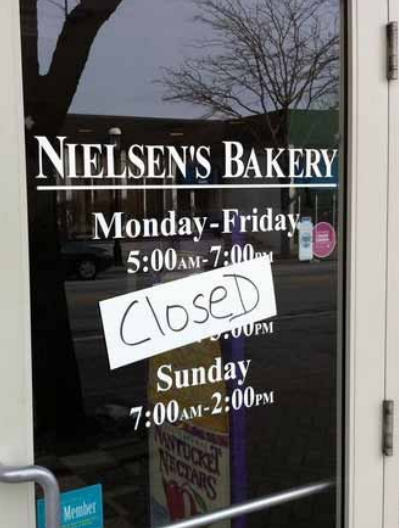I had a hankering for a croissant and decided to drive over to Nielsen’s Bakery, a local bakery I don’t go to often, but they made nice croissants. All I found was a letter on the window saying they had closed after 21 years. The letter read like a note to a few insider friends and I could not really understand what it said, except that they were closing.
The letter confirmed to me why I had not patronized them for years. I always felt I was an outsider there, a tolerated visitor interrupting a local Kaffeeklatsch (an informal gathering) at the local clubhouse.
Nielson’s was in downtown Homewood, Illinois, next to the commuter train stop. A Starbucks with a drive-through now operates on the other side of the parking lot. The Starbucks does $20,000 a week in business and there are two other Starbucks in the area that do a similar amount of business. My guess is that Nielsen’s was lucky to do $5000 a week. Nielsen’s was a daytime operation while Starbucks is open 5:30 a.m. to 10 p.m.
Another local bakery, Sweet Annie’s, opened three years ago, and in my opinion that was the final blow that killed Nielsen’s. Not only were Annie’s baked goods superior, the ambience of the shop was warm and welcoming.
Another element most likely came into play in the demise of this small business. Homewood, like the rest of the south Chicago suburbs where I live, is becoming a predominantly African American community. Nielsen’s was clearly an old school Homewood institution, patronized mainly by Caucasians—and proud of it. If I felt like an outsider when I walked in, I’m sure a black person would have felt uncomfortable there.
The restaurants and stores in my neighborhood need to feel like they are connected to their customers. Most businesses, even those that do business online or on the phone, need to have a welcoming feel. Airlines with call centers in India lose tons of business because the people who finally answer the phone have no personal touch, are unable to connect with the customer, and are often hard to understand. Cold callers who read from a script rarely get more than a sentence out before I hang upon them.
A machining company owner that thinks he or she is just selling parts with no need for a personal connection with their customers does not understand how business works.
Nielsen’s Bakery didn’t fail because of the recession, though it didn’t help. They failed for many reasons, but the primary one was that they just wanted their little neighborhood bakery to stay the same while the world around them was changing by the day.
Today’s Machining World Archives April 2011 Volume 07 Issue 03

